Ukraine-Russia war: Australian PM Anthony Albanese tours war ravaged towns, condemns Russia ‘brutal invasion’
Anthony Albanese’s visit to war torn Kyiv has been praised by Australia’s ambassador to Ukraine, as Albo had some tough words for Vladimir Putin.
World
Don't miss out on the headlines from World. Followed categories will be added to My News.
Ukraine’s Ambassador to Australia Vasyl Myroshnychenko has said Prime Minister Anthony Albanese’s trip to Kyiv was a “crucial visit” for bilateral relations.
“I was very pleased to be here to witness that,” Mr Myroshnychenko told Sky News host Chris Kenny from Kyiv.
“For me, as Ukrainian ambassador to Australia right now I felt really humbled to see that experience.”
It comes as during Mr Albanese’s tour of war torn Ukraine, the PM conveyed Australians’ “admiration and respect” for President Volodymyr Zelenskyy’s leadership, and condemned Russia’s “brutal invasion”.
“It is unprovoked, it is against international law, it is against the UN charter,” the Prime Minister said before a one-on-one meeting with his Ukrainian counterpart in Kyiv.
The leaders discussed the country’s food security and its inability to export grain, which has caused international food shortages.
It’s understood the leaders spoke about the November G20 summit in Indonesia, which could be attended by Russian President Vladimir Putin.
Indonesia’s President Joko Widodo has resisted suggestions by the US and other nations they could boycott the event if Mr Putin attended.
Mr Zelenskyy, who was personally invited to attend the summit by Mr Widodo on his recent trip to Kyiv, said he was “not sure there will be a great number of participants if (Russia) … decides to attend”.
He said he “cannot imagine myself arriving” at the Indonesian-hosted summit if the war with Russia was still continuing then.
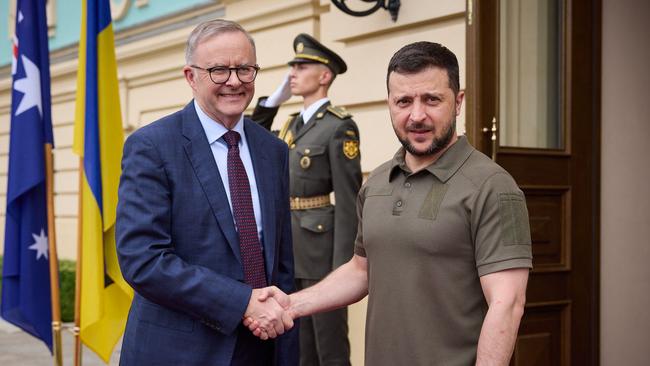
Mr Albanese reiterated that Australia would attend the summit, even if Mr Putin did, because of Australia’s relationship with Indonesia.
But he said Australia supported “isolating Russia as much as possible, and my presence here is an indication of that”.
“If it is the case that Mr Putin attends that meeting, and I’m not sure whether he will or not, he will get the reception he deserves”.
Arriving in Ukraine via train from Poland on Sunday, Mr Albanese travelled first by motorcade to Bucha, to pay his respects at the mass grave where 416 civilians were buried by Russian forces after they were executed.
“Bucha is now a notorious name,” local council head Tars Shaprovskiy told him.
“This is a very sad place.
“Every one of them shot. This was not collateral damage, this was intentional.
“One of the slaughter house was a summer camp. There were four volunteers there. They were all shot.”
Mr Albanese said: “Australia shares your desire to seek justice for these war crimes, and we will continue to do so.”
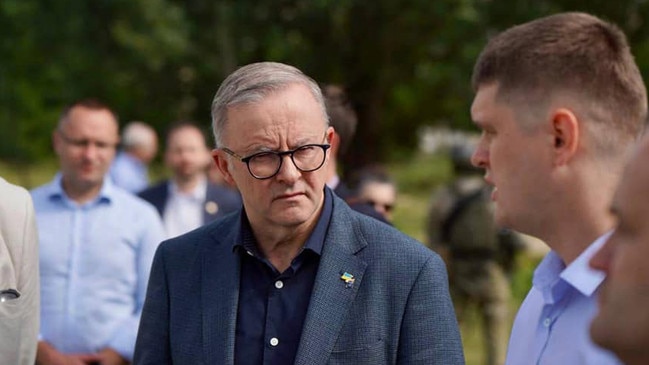
The grave, behind the town’s Church of St Andrews, has become a pilgrimage site for visiting dignitaries.
In a chapel underneath the church, Mr Albanese joined the congregation, lighting a candle for the victims of the massacre.
Mr Albanese travelled in an armoured Land Cruiser in a motorcade of about ten vehicles. Local traffic was blocked wherever they went, with soldiers and police stationed along the route.
In central Kyiv concrete blocks and sandbags protected major buildings, and large welded steel road spikes sat at the sides of key routes into the city, ready to be deployed if the invaders try and attack the city again.
But 30 minutes to the north of the city, the signs of the war were obvious – blown out buildings, missile craters, broken windows, piled-up wrecks of burned out cars and sandbagged foxholes under the cover of trees.
Mr Albanese also visited the destroyed Hostomel Airport, the site of the failed Russian paratrooper assault in the initial days of the invasion, aimed at securing the facility to surge in troops and supplies by air for the battle of Kyiv.
He shook his head as he surveyed the wreckage of the what was once the world’s largest aircraft the Anatov Mriya, which translates to “The Dream”.
Mr Albanese spoke to members of the national guard unit that repelled a determined attack by Russian forces to land helicopters at the airfield, which could have changed the course of the war.
As he left, they gave him a model of the famous Anatov plane to take home to Canberra.
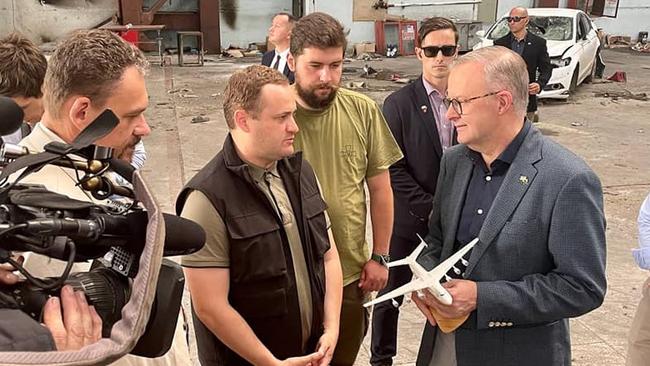
Mr Albanese said as a former aviation minister, he was touched by the gesture, and the model would take “pride of place” in his prime ministerial office.
Ukraine’s Ambassador to Australia, Vasyl Myroschnychenko, travelled to Kyiv for the visit, which he agitated for behind the scenes after delivering an official invitation for Mr Zelenskyy.
At first, Australian Foreign Affairs officials pronounced the trip “impossible”. But within weeks, plans were underway to make it happen.
An advance security team comprising 2nd Commando and Special Air Service Regiment personnel were deployed to the country to work with the Ukraine Defence Force and the Australian Embassy – now based temporarily in Poland – to make the visit happen.
A member of the team said the capital was mostly safe. The main risk was a potential missile strike. Russia has recently upped its use of rockets against targets across the country in retaliation for Ukraine’s use of American-donated HIMARS missiles.
Ukraine’s Deputy Foreign Affairs Minister Mykola Tochytskyi said things were “much more difficult in the east”, where Ukrainian forces are being pounded relentlessly by Russian artillery.
“If you look at the quantity of her artillery, it is one to seven (to Russia),” he said.
“That’s why we appreciate Australia’s support, in Bushmaster (protected vehicles), and M777 artillery. They are very effective.”
The trip was made under a strict media blackout imposed by the prime minister’s office on the advice of the Australian Defence Force.
‘DEVASTATING’: ALBO VISITS WAR-RAVAGED UKRAINE TOWNS
The Russian bombing of homes around Kyiv is a “war crime” Anthony Albanese has declared, as Australia pledges an extra $100 million in military aid to Ukraine.
The Prime Minister tour the three war ravaged towns of Bucha, Gostomel and Irpin on Sunday, before meeting with Ukrainian President Volodymyr Zelenskyy to discuss the ongoing war.
Touring the damaged streets of Irpen, Mr Albanese described the scenes as “devastating”.
“Here we have what (is) clearly a residential building,” he said.
“Another one just behind it. Brutally assaulted. You know, this is a war crime.”
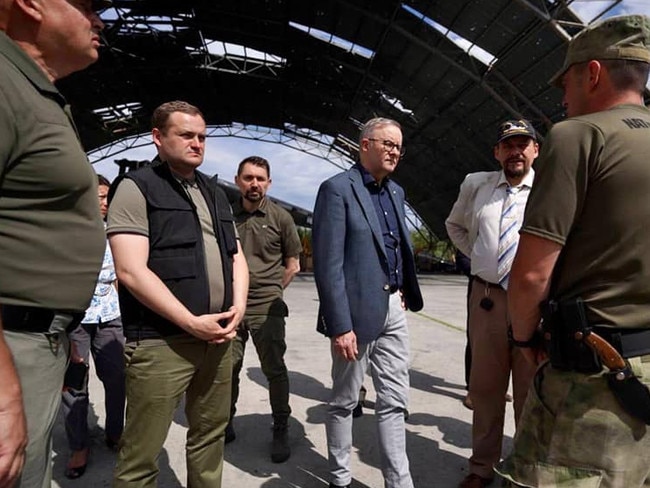
Mr Albanese said lives and livelihoods had been lost.
“The fact that you had such a significant force – you can see the use of tanks, missiles, heavy artillery being used in a civilian area – it’s just devastating,” he said.
Meeting with Mr Zelensky, Mr Albanese expressed Australia’s support for the people of Ukraine and the defence of their homeland.
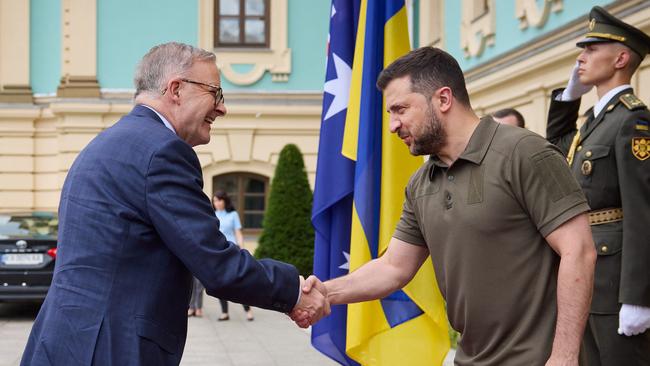
“I pay tribute to the courage, resilience, bravery and determination of you as the leader of Ukraine, of your defence force, but importantly as well of your entire population who are determined to stand up to a bully which is breaching international law without any provocation or any excuse,” Mr Albanese told his Ukrainian counterpart.
“Australia will intervene in the International Court of Justice in support of Ukraine in its case against Russia.”
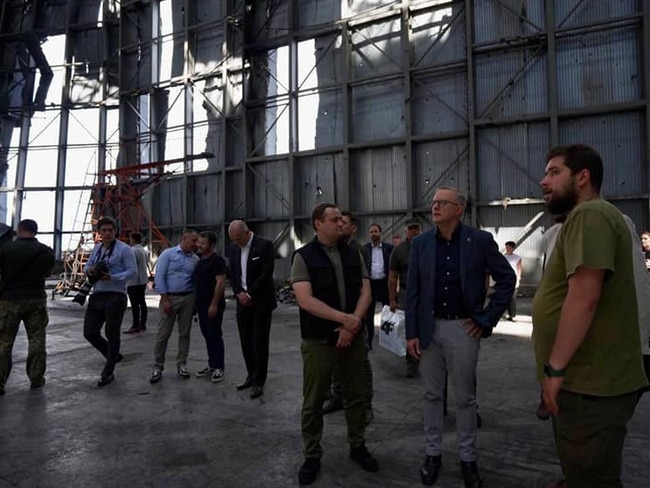
Mr Albanese also announced further targeted financial sanctions and travel bans on 16 additional Russian ministers and oligarchs, bringing the total number to 843 individuals and 62 entities being targeted.
The Prime Minister committed $99.5m in additional military assistance for Ukraine, including 14 armoured personnel carriers, 20 Bushmaster protected mobility vehicles and a contribution to NATO’s Ukraine Comprehensive Assistance Package Trust Fund.
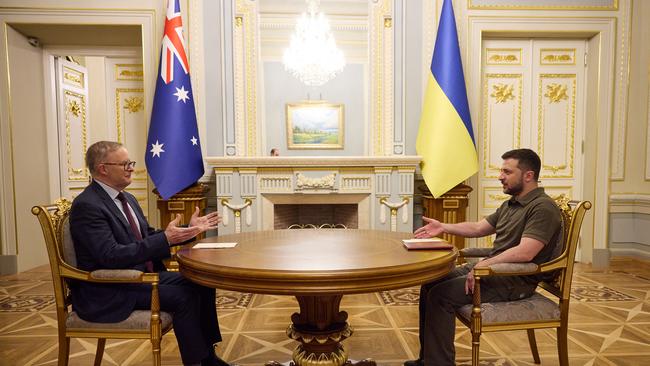
Mr Zelenskyy said he wished the meeting with Mr Albanese was taking place in peacetime, but thanked him for visiting and the support from Australia.
“Our defenders highly appreciated, in particular, the Australian Bushmaster armoured personnel carriers and other specific assistance from Australia,” he said.
Mr Zelenskyy said international cooperation must be strengthened in order to “break Russia’s aggressive potential”.
“I informed Mr Prime Minister (Albanese) about the situation on the frontline, about our capabilities, technical comparison, resistance to the occupiers,” he said.
“We must increase the sanctions pressure on the aggressor.”
“I am grateful to Australia for its firm, unyielding position on this issue,” he said.
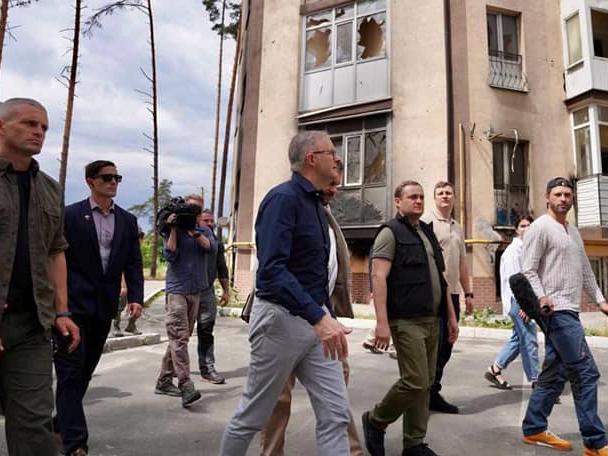
Speaking earlier in the week, Mr Albanese said Australia was “proud” to be the largest non-NATO contributor to the Ukrainian war effort.
Australia has provided $285 million in military aid to Ukraine, and a further $65m in humanitarian assistance.
In May, Mr Zelenskyy addressed the Australian Parliament via video link and requested further military support, noting the Ukrainian forces needed “Bushmaster” Protected Mobility Vehicles.
Australia subsequently sent 20 Bushmasters and 14 M113 Armoured Personnel Carriers to Ukraine to defend against a Russian offensive in the eastern Donbas region.
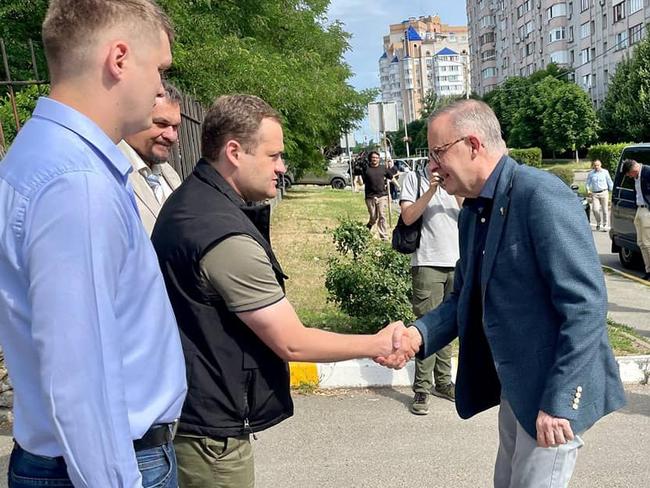
RUSSIA CLAIMS VICTORY OVER UKRAINIAN CITY OF LYSYCHANSK
Russia claimed on Sunday to have captured the strategic Ukrainian city of Lysychansk and the entire frontline Lugansk region which would mark a decisive breakthrough for Moscow’s forces seeking control of the country’s east.
The mayor of Sloviansk, 75 kilometres west of Lysychansk, reported on Sunday that “many” people were killed in fresh bombardment by the advancing Russian forces.
The development came as Belarus said it had intercepted missiles fired by Kyiv and Russia reported that Ukraine launched three cluster missiles at Belgorod, killing four people.
Lysychansk had been the last major city in the Lugansk area of the Donbas still in Ukrainian hands and its capture would signal a deeper push into the eastern region, Moscow’s focus since retreating from Kyiv.
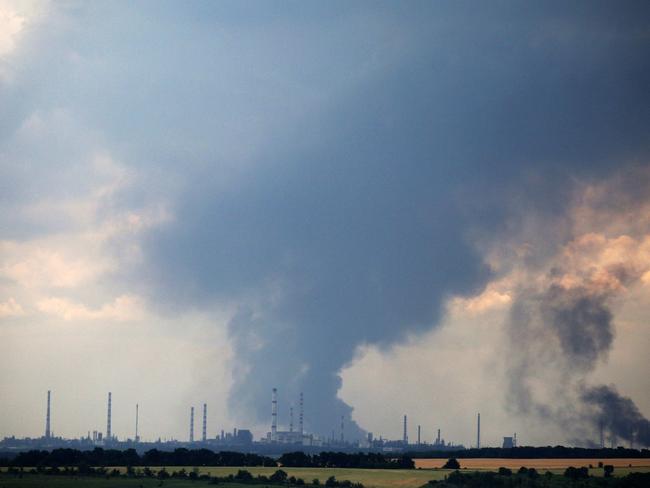
On Saturday, there were conflicting reports about Lysychansk’s status with Ukraine denying Moscow’s claim to have encircled the entire city, located across the river from neighbouring Severodonetsk which Russian forces seized last week.
Ukraine has yet to comment on the claim that Lysychansk has fallen following days of intense clashes.
“Sergei Shoigu has informed the commander in chief of the Russian armed forces, Vladimir Putin, of the liberation of the People’s Republic of Lugansk,” the defence ministry said in a statement quoted by Russian news agencies.
In Siversk, 30 kilometres west of Lysychansk, there was overnight shelling, residents and an official told AFP.
“It was intense and it was shooting from all sides,” said a woman sheltering in a cellar.
Russia’s claim of a breakthrough came as Moscow said on Sunday its anti-aircraft defences shot down three Tochka-U cluster missiles launched by “Ukrainian nationalists” against Belgorod, close to the Ukrainian border.
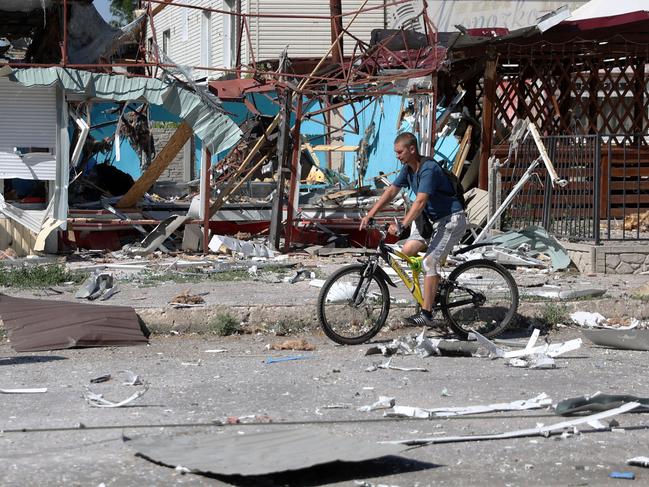
Belgorod governor Vyacheslav Gladkov said 11 residential buildings and 39 houses were damaged.
Russia has previously accused Kyiv of conducting strikes on Russian soil, particularly in the Belgorod region.
Missiles continued to rain down across Ukraine, killing dozens, and fierce fighting continued according to Ukrainian President Volodymyr Zelensky.
“Fierce fighting continues along the entire frontline, in Donbas,” he said in an address late Saturday, adding that “enemy activity in the Kharkiv region is intensifying”.
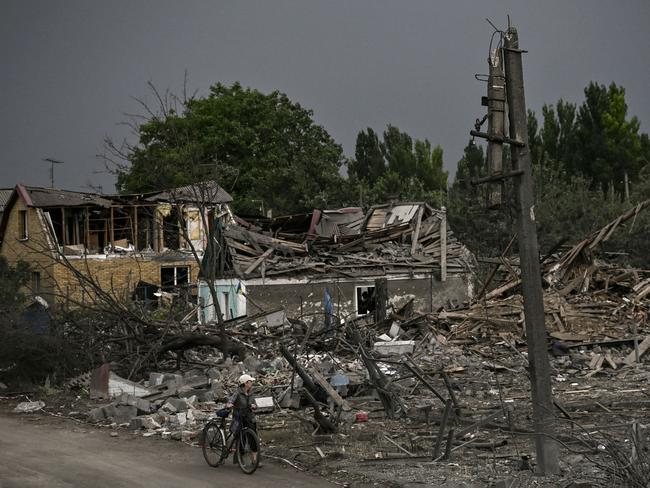
Two people were killed and three wounded -- including two children -- in a strike on the town of Dobropillya, local authorities in Donetsk said.
A Ukrainian official said Sunday that his country’s forces had “put out of action” a Russian military base in Melitopol, while the Ukrainian army said the air force had taken out around 20 Russian units and two ammunition depots.
“The town of Melitopol is covered in smoke,” said the official, the city’s exiled mayor Ivan Fedorov.
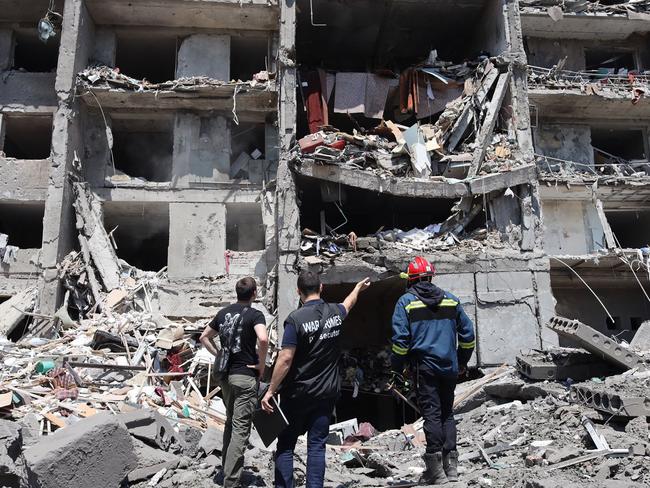
Gaidai’s update came hours after Ukraine denied claims by Moscow-backed separatists that they had encircled Lysychansk.
The violence also spilt into Russia on Sunday, with at least three people killed and four injured in “strong explosions” in Belgorod, which borders Ukraine.
Belgorod governor Vyacheslav Gladkov said 11 residential buildings and 39 houses were damaged but stopped short of accusing Ukrainian forces of being behind the strikes.
But Russia has previously accused Kyiv of conducting strikes on Russian soil, particularly in the Belgorod region.
Missiles continued to rain down across Ukraine, killing dozens.
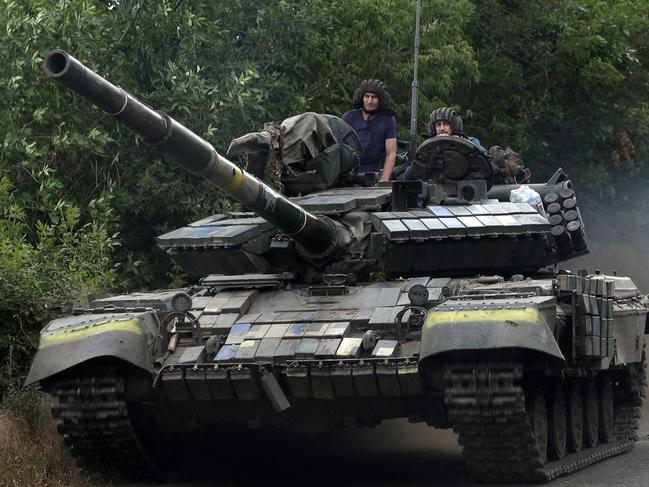
Ukrainian President Volodymyr Zelensky cited six strikes as of the evening in his daily address to the nation late Saturday.
“Fierce fighting continues along the entire front line, in Donbas,” he added, noting as well that “enemy activity in the Kharkiv region is intensifying”.
In the small Donetsk town of Siversk, one resident told AFP that “the bombing goes on day and night.”
Two people were killed and three wounded – including two children – in a strike on the town of Dobropillya, local authorities in Donetsk said.
Rockets also struck residential properties in Sloviansk in the heart of the Donbas, killing a woman in her garden and wounding her husband, a neighbour told AFP Saturday, describing debris showered across the neighbourhood.
The witness said the strike, which took place on Friday, was thought to use cluster munitions, which spread over a large area before exploding, striking buildings and people who were outdoors.
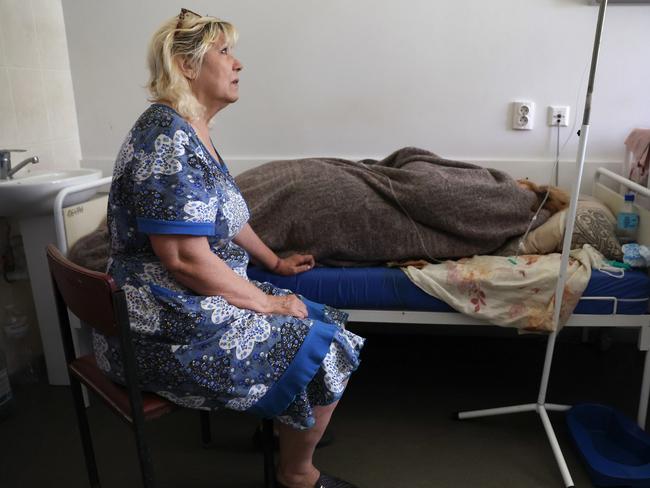
Zelensky warned against “a feeling of relaxation” in many rear cities.
“The war is not over,” he said. “Unfortunately, its cruelty is only increasing in some places, and it cannot be forgotten.”
Russian defence ministry spokesman Igor Konashenkov said Ukraine was “suffering heavy losses on all fronts”, listing what he said were military targets across the country hit with artillery and missiles.
In his address, Zelensky also looked forward to a conference on Ukraine’s reconstruction set to start Monday in Switzerland.
Leaders from dozens of countries and international organisations will gather in the city of Lugano with the aim of providing a roadmap for the war-ravaged country’s recovery.
Rebuilding Ukraine “requires colossal investments — billions, new technologies, best practices, new institutions and, of course, reforms,” Zelensky said.
He said 10 regions of Ukraine had been affected in the war, with many towns and villages needing to be “rebuilt from scratch”.
The roadmap is expected to lay out reconstruction needs in terms of damaged and destroyed infrastructure, Ukraine’s devastated economy, and also environmental and social recovery needs.
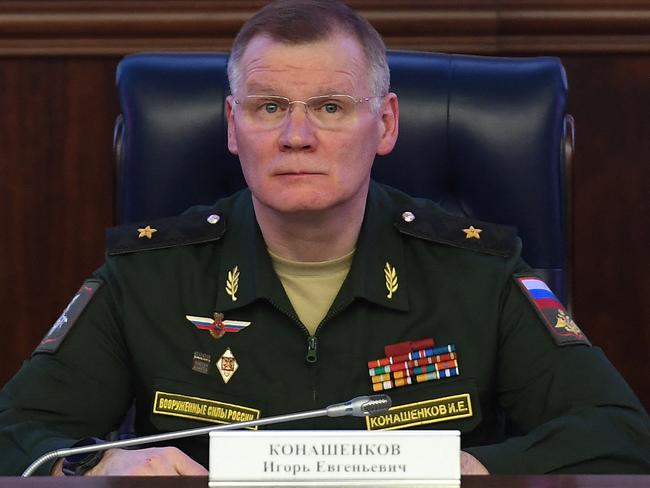
The effort is expected to cost hundreds of billions of dollars.
Ukraine will also face demands for broad reforms, especially in cracking down on corruption.
The need for reforms had been underscored by European Commission, Ursula von der Leyen, who has said the coveted European Union membership was “within reach” for Ukraine, but urged Kyiv to work on anti-corruption measures.
In peacetime, Ukraine is a major agricultural exporter, but Russia’s invasion has damaged farmland and seen Ukraine’s ports seized, razed or blockaded — sparking concerns about food shortages, particularly in poor countries.
Farmer Sergiy Lioubarsky, whose fields are close to the frontline, warned time was running out to harvest this year’s crop.
“We can wait until August 10 at the latest, but after that, the grains are going to dry out and fall to the ground,” he said.
Western powers have accused Putin of using the trapped harvest as a weapon to increase pressure on the international community, and Russia has been accused of stealing grain.
RUSSIANS CLAIM ‘TORTURE’
Russia said on Tuesday it was investigating the torture of Russian soldiers held prisoner in Ukraine and released as part of a prisoner swap with Kyiv in late June.
The Russian Investigative Committee, which probes major crimes, said in a statement that it was “verifying facts of inhuman treatment of Russia soldier prisoners in Ukraine”.
Last week Moscow and Kyiv exchanged 144 prisoners of war each – the biggest exchange since the start of Moscow’s Ukraine campaign launched on February 24.
The Russian committee said Moscow’s soldiers told investigators about “the violence they had suffered”.
According to its statement, one of the soldiers said Ukrainian medics treated him without anaesthetic and that he was “beaten, tortured with electricity” in captivity.
The soldier allegedly said he was left without food and water for days. Another injured Russian soldier, who had his left amputated, said he was badly beaten and had his wound irritated by Ukrainian medics, the statement said.
The testimonies of the freed Russian soldiers are examples of “violations of the Geneva Convention on prisoners of war”, the Russian committee said.
More Coverage
Read related topics:Anthony Albanese




